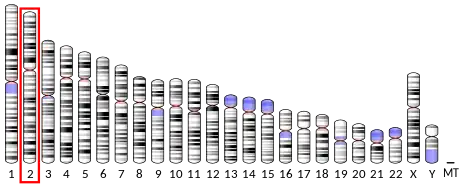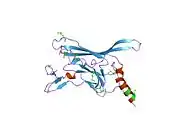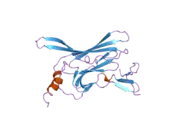G protein-activated inward rectifier potassium channel 1 (GIRK-1) is encoded in the human by the gene KCNJ3.[5]
Potassium channels are present in most mammalian cells, where they participate in a wide range of physiologic responses. The protein encoded by this gene is an integral membrane protein and inward-rectifier type potassium channel. The encoded protein, which has a greater tendency to allow potassium to flow into a cell rather than out of a cell, is controlled by G-proteins and plays an important role in regulating heartbeat. It associates with three other G-protein-activated potassium channels to form a hetero-tetrameric pore-forming complex.[5]
Interactions
See also
References
- 1 2 3 GRCh38: Ensembl release 89: ENSG00000162989 - Ensembl, May 2017
- 1 2 3 GRCm38: Ensembl release 89: ENSMUSG00000026824 - Ensembl, May 2017
- ↑ "Human PubMed Reference:". National Center for Biotechnology Information, U.S. National Library of Medicine.
- ↑ "Mouse PubMed Reference:". National Center for Biotechnology Information, U.S. National Library of Medicine.
- 1 2 "Entrez Gene: KCNJ3 potassium inwardly-rectifying channel, subfamily J, member 3".
- ↑ Huang, C L; Jan Y N; Jan L Y (Apr 1997). "Binding of the G protein betagamma subunit to multiple regions of G protein-gated inward-rectifying K+ channels". FEBS Lett. 405 (3): 291–8. doi:10.1016/S0014-5793(97)00197-X. ISSN 0014-5793. PMID 9108307. S2CID 44072628.
- ↑ He, Cheng; Yan Xixin; Zhang Hailin; Mirshahi Tooraj; Jin Taihao; Huang Aijun; Logothetis Diomedes E (Feb 2002). "Identification of critical residues controlling G protein-gated inwardly rectifying K(+) channel activity through interactions with the beta gamma subunits of G proteins". J. Biol. Chem. 277 (8): 6088–96. doi:10.1074/jbc.M104851200. ISSN 0021-9258. PMID 11741896.
Further reading
- Kubo Y, Adelman JP, Clapham DE, et al. (2006). "International Union of Pharmacology. LIV. Nomenclature and molecular relationships of inwardly rectifying potassium channels". Pharmacol. Rev. 57 (4): 509–26. doi:10.1124/pr.57.4.11. PMID 16382105. S2CID 11588492.
- Stoffel M, Espinosa R, Powell KL, et al. (1994). "Human G-protein-coupled inwardly rectifying potassium channel (GIRK1) gene (KCNJ3): localization to chromosome 2 and identification of a simple tandem repeat polymorphism". Genomics. 21 (1): 254–6. doi:10.1006/geno.1994.1253. PMID 8088798.
- Schoots O, Yue KT, MacDonald JF, et al. (1996). "Cloning of a G protein-activated inwardly rectifying potassium channel from human cerebellum". Brain Res. Mol. Brain Res. 39 (1–2): 23–30. doi:10.1016/0169-328X(95)00349-W. PMID 8804710.
- Chan KW, Langan MN, Sui JL, et al. (1996). "A recombinant inwardly rectifying potassium channel coupled to GTP- binding proteins". J. Gen. Physiol. 107 (3): 381–97. doi:10.1085/jgp.107.3.381. PMC 2216996. PMID 8868049.
- Liao YJ, Jan YN, Jan LY (1996). "Heteromultimerization of G-protein-gated inwardly rectifying K+ channel proteins GIRK1 and GIRK2 and their altered expression in weaver brain". J. Neurosci. 16 (22): 7137–50. doi:10.1523/JNEUROSCI.16-22-07137.1996. PMC 6578936. PMID 8929423.
- Signorini S, Liao YJ, Duncan SA, et al. (1997). "Normal cerebellar development but susceptibility to seizures in mice lacking G protein-coupled, inwardly rectifying K+ channel GIRK2". Proc. Natl. Acad. Sci. U.S.A. 94 (3): 923–7. Bibcode:1997PNAS...94..923S. doi:10.1073/pnas.94.3.923. PMC 19615. PMID 9023358.
- Huang CL, Jan YN, Jan LY (1997). "Binding of the G protein betagamma subunit to multiple regions of G protein-gated inward-rectifying K+ channels". FEBS Lett. 405 (3): 291–8. doi:10.1016/S0014-5793(97)00197-X. PMID 9108307. S2CID 44072628.
- Schoots O, Voskoglou T, Van Tol HH (1997). "Genomic organization and promoter analysis of the human G-protein-coupled K+ channel Kir3.1 (KCNJ3/HGIRK1)". Genomics. 39 (3): 279–88. doi:10.1006/geno.1996.4495. PMID 9119365.
- Corey S, Clapham DE (1998). "Identification of native atrial G-protein-regulated inwardly rectifying K+ (GIRK4) channel homomultimers". J. Biol. Chem. 273 (42): 27499–504. doi:10.1074/jbc.273.42.27499. PMID 9765280.
- Kennedy ME, Nemec J, Corey S, et al. (1999). "GIRK4 confers appropriate processing and cell surface localization to G-protein-gated potassium channels". J. Biol. Chem. 274 (4): 2571–82. doi:10.1074/jbc.274.4.2571. PMID 9891030.
- Pabon A, Chan KW, Sui JL, et al. (2000). "Glycosylation of GIRK1 at Asn119 and ROMK1 at Asn117 has different consequences in potassium channel function". J. Biol. Chem. 275 (39): 30677–82. doi:10.1074/jbc.M005338200. PMID 10889209.
- He C, Yan X, Zhang H, et al. (2002). "Identification of critical residues controlling G protein-gated inwardly rectifying K(+) channel activity through interactions with the beta gamma subunits of G proteins". J. Biol. Chem. 277 (8): 6088–96. doi:10.1074/jbc.M104851200. PMID 11741896.
- Chen L, Kawano T, Bajic S, et al. (2002). "A glutamate residue at the C terminus regulates activity of inward rectifier K+ channels: Implication for Andersen's syndrome". Proc. Natl. Acad. Sci. U.S.A. 99 (12): 8430–5. Bibcode:2002PNAS...99.8430C. doi:10.1073/pnas.122682899. PMC 123084. PMID 12034888.
- Lavine N, Ethier N, Oak JN, et al. (2003). "G protein-coupled receptors form stable complexes with inwardly rectifying potassium channels and adenylyl cyclase". J. Biol. Chem. 277 (48): 46010–9. doi:10.1074/jbc.M205035200. PMID 12297500.
- Strausberg RL, Feingold EA, Grouse LH, et al. (2003). "Generation and initial analysis of more than 15,000 full-length human and mouse cDNA sequences". Proc. Natl. Acad. Sci. U.S.A. 99 (26): 16899–903. Bibcode:2002PNAS...9916899M. doi:10.1073/pnas.242603899. PMC 139241. PMID 12477932.
- Ivanina T, Rishal I, Varon D, et al. (2003). "Mapping the Gbetagamma-binding sites in GIRK1 and GIRK2 subunits of the G protein-activated K+ channel". J. Biol. Chem. 278 (31): 29174–83. doi:10.1074/jbc.M304518200. PMID 12743112.
- Shankar H, Murugappan S, Kim S, et al. (2004). "Role of G protein-gated inwardly rectifying potassium channels in P2Y12 receptor-mediated platelet functional responses". Blood. 104 (5): 1335–43. doi:10.1182/blood-2004-01-0069. PMID 15142872.
- Gerhard DS, Wagner L, Feingold EA, et al. (2004). "The Status, Quality, and Expansion of the NIH Full-Length cDNA Project: The Mammalian Gene Collection (MGC)". Genome Res. 14 (10B): 2121–7. doi:10.1101/gr.2596504. PMC 528928. PMID 15489334.
- Plummer HK, Dhar MS, Cekanova M, Schuller HM (2006). "Expression of G-protein inwardly rectifying potassium channels (GIRKs) in lung cancer cell lines". BMC Cancer. 5: 104. doi:10.1186/1471-2407-5-104. PMC 1208863. PMID 16109170.
External links
- KCNJ3+protein,+human at the U.S. National Library of Medicine Medical Subject Headings (MeSH)
This article incorporates text from the United States National Library of Medicine, which is in the public domain.








